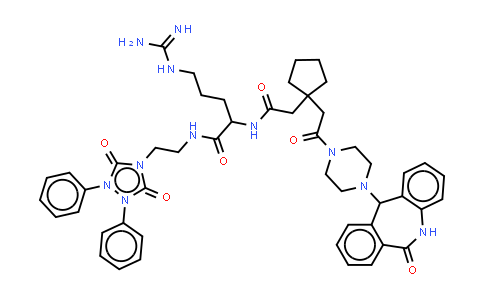
BIIE-0246 NLT 98%
SKU : MC544003
CAS Number : 246146-55-4
Molecular Formula : C49H57N11O6 | Molecular Weight : 896.05
Synonyms : AR-H 053591
Quote Request| Purity | NLT 98% |
|---|---|
| Storage | at 20ºC 2 years |
* The above information is for reference only.
* If the product has intellectual property rights, a license granted is must or contact us.
| Chemical Name | BIIE-0246 |
|---|---|
| CAS Number | 246146-55-4 |
| MDL Number | MFCD04113026 |
| Molecular Formula | C49H57N11O6 |
| Molecular Weight | 896.05 |
| Synonyms | AR-H 053591 |
BIIE-0246 is a potent and highly selective non-peptide neuropeptide Y (NPY) Y2 receptor antagonist, with an IC50 of 15 nM. IC50 & Target: IC50: 15 nM (NPYY2 receptor)[1]. In Vitro: Receptor binding assays in HEK 293 cells transfected with the rat Y2 receptor cDNA demonstrate that BIIE-0246 competes with high affinity (IC50=15±3 nM) against specific [125I]PYY3-36 binding sites. In contrast, BIIE-0246, at concentrations up to 10 μM, fails to compete for significant amounts of specific [125I]GR231118, [125I]hPP and [125I][Leu31, Pro34]PYY binding sites in HEK 293 cells transfected with the rat Y1, Y4 or Y5 receptor cDNA, respectively[1]. In Vivo: On chow diet, genetically obese NPY mice show increased gain in body weight and adiposity. Treatment with BIIE-0246 promotes body weight gain in both genotypes after 4.5 weeks, and already at 2 weeks. BIIE-0246 has no significant effect on fat mass gain. In DIO, BIIE-0246 has different effects on body weight and composition depending on the genotype (treatment×genotype interaction in body weight P<0.05, in fat mass P<0.001 and in lean mass P<0.05). In DIO-WT group, post hoc analysis reveals increased body weight and fat mass gain, and a tendency to decrease lean mass gain. In DIO-NPY, BIIE-0246 inhibits fat mass gain (P=0.05). Interestingly, increased cholesterol levels are detected also in WT mice treated with BIIE-0246 for 2 weeks, but not in the 4.5-week cohort. In DIO-NPY mice in both treatment groups, cholesterol levels correlate positively with body fat mass (DIO-NPY vehicle P<0.01; DIO-NPY BIIE-0246 P<0.001), but not in any other group, and the slope of the regression curve of cholesterol and fat mass is significantly decreased in BIIE-0246-treated DIO-NPY group when compared with vehicle-treated group[2].
Related Products
© Copyright 2015-2024 Hangzhou MolCore BioPharmatech Co.,Ltd. All rights reserved.
